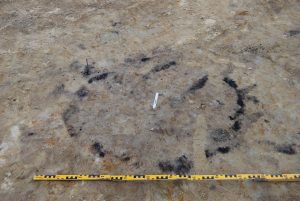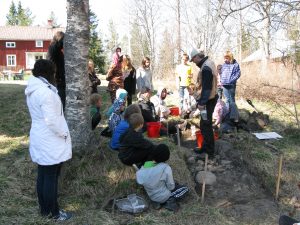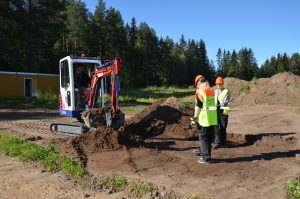Archaeology is usually associated with humanity’s ancient history and preliterate societies. The Middle Ages (c. 1050-1500 CE) are usually considered the period when events began to be recorded in writing. Archaeologists can also study younger periods (from around the 16th century and onwards), for which excavations are used to complement the attested history.
The traces that people leave behind can take myriad forms. Some remains can be seen above ground e.g. burial cairns or trapping pits. Other remains only become visible once the top ground layer has been removed using excavating machinery. Soil colourations, which are different from the natural soil, then become visible. The colourations may indicate traces of features such as post-holes, hearths, or cooking pits. During an archaeological investigation, archaeologists may also find fragments of objects as well as debris and household waste.

A hearth visible as a black ring beneath the topsoil
Archaeologists attempt to interpret the different remains in order to understand how humans once lived. To help them, archaeologists employ a wide range of analysis methods, which are continuously being improved and further developed. As a result, archaeological material can never be considered to be exhaustively studied. There are always new questions that can be asked of the material and new analysis methods that can be implemented.
An archaeologist’s role does not just involve investigating and documenting archaeological remains. Archaeologists also work to disseminate knowledge of the people who lived long before us. Talking about ancient peoples and spreading knowledge about our shared cultural heritage is an important duty of archaeologists.

School class in Lövånger visiting an excavation
Most archaeological investigations in Sweden are carried out in conjunction with various exploitation activities. When building new roads, railways and residential areas, it is sometimes necessary for the area to be surveyed by archaeologists. In Sweden, the county administrative boards determine whether an archaeological excavation is needed. Decisions are made based on the Swedish Historic Environment Act, which prohibits the interference or destruction of archaeological remains without permission.

Investigation related to the construction of the Västra Länken ring road, Umeå

